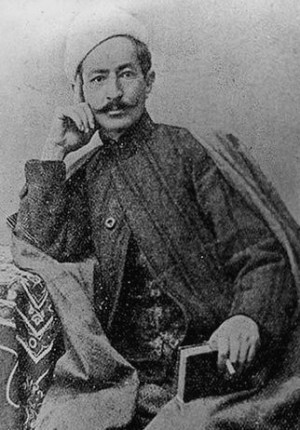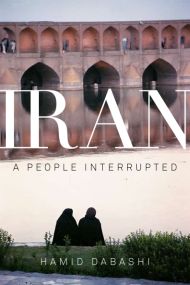
Nationalist Poet, Aref Qazvini (1882-1934)
Purchase from New Press
Purchase from Barnes & Noble
“I write this book to persuade people to discard the clichéd categorization of Iran as a country caught between a belligerent tradition and an alien modernity and to adopt a more historically nuanced, culturally multifaceted, and materially grounded reading of Iran.”
— Hamid Dabashi
Iran: A People Interrupted is a concise account of Iranian history from the early nineteenth century up until current day Iran and the predicaments of an Islamic Republic. The book describes key historical events in Iran, its cultural trends and political developments, up to the collapse of the Reform Movement in 2005 and the resumed hostilities between the Islamic Republic and the Bush Administration over the nuclear issue and the war on terror. The outline of these historical details is the premise of Hamid Dabashi’s theory of “anticolonial modernity”.
Dabashi tells the story of Iran through a detailed account of the cosmopolitan culture of a society normatively founded on its long anticolonial struggles. Paying close attention to the multifaceted emancipatory movements of Iran — among them literature, poetry, music, art, cinema, all underwritten with a sustained concern with the Iranian women’s movement, Dabashi’s historiography is a radical departure from the existing narratives of modern Iranian history. Written in a highly ambitious literary narrative, Iran: A People Interrupted is a daring inroad into a provocative mode of historiography that combines critical narratives, detailed pauses on crucial events, and expansive theoretical speculations, all punctuated with autobiographical implosions of his overriding narrative.
Dabashi’s underlying hypothesis is that as a nation-state Iran must be understood as a site of defiance against both domestic tyranny (embracing both an authoritarian monarchy and a totalitarian theocracy) and foreign intervention (ranging from the height of European colonialism down to the rise of American imperialism). Predicated on this premise, Dabashi’s theory of anticolonial modernity puts forward a radically different manner of looking at the history and trajectory of European colonial modernity around the globe.
Among its many topics, the book features discussions of the new and combative presidency of Mahmoud Ahmadinejad and his current showdown with the United States, as well as the rise of Iran as a major regional power in the Middle East, the Salman Rushdie Affair, the Iran-Iraq War, the Islamic Revolution, the U.S. hostage crisis of 1979, the role of Iran during the Cold War, the tyrannical regime of the Pahlavis, the Iranian Constitutional Revolution, the end of the Qajar dynasty, all the way back to the rise of colonial modernity in nineteenth century.
Content
Introduction
Chapter One: On Nations without Borders
Chapter Two: The Dawn of Colonial Modernity
Chapter Three: A Constitutional Revolution
Chapter Four: The Pahlavis
Chapter Five: An Islamic Revolution
Chapter Six: To Reconstruct and Reform
Chapter Seven: The End of Islamic Ideology
Postscript
Notes
Index
Iran: A People Interrupted will soon be available through The Caravan Project in alternative formats, such as online downloading of the book, in its entirety or in chapters, audio CD and large-print versions.
Advance Praise for Iran: A People Interrupted
“[Iran: A People Interrupted] cuts through the myths, past and present, that Americans have been told about Iran. It is a wealth of information, presenting Iran’s history through the lens of its literary cosmopolitanism, and interpreting recent politics in the broader context of post-colonial resistance. More than a monograph, it contributes to global knowledge, exemplary of a new Leftist discourse that is undogmatic and non-sectarian. The style is open and intimate. You will know when you read this book that you are with a humanist who deeply loves his country, and invites you to feel very much at home.”
—Susan Buck-Morss, Cornell University
“Hamid Dabashi provides a lucid narrative of the last two hundred years of Iranian history around the compelling argument that contemporary Iran needs to be understood as the site of an ongoing contest between two contrasting visions of modernity, one colonial, the other anticolonial.”
—Mahmood Mamdani, Columbia University
“Hamid Dabashi’s Iran is a spectacular, important, and incisive discussion of today’s ‘real’ Iran—its complexity, its elusiveness, its modernity, its struggle with its complex culture and history. The Iran that the Bush administration promotes as the axis of evil is nowhere to be found here. This is a crucial book for our times. I loved reading it for its passion and extraordinary vision. It is urgent that each of us read this book to give us the knowledge and commitment to stand against war and build the possibilities for peace and global justice.”
—Zillah Eisenstein, Ithaca College
“[Dabashi’s book is a] brilliant analysis of the Iranian state of mind…Dabashi insists on a nuanced reading of the complexities of the Iranian social fabric.”
—Hannan Hever, The Hebrew University of Jerusalem
“Dabashi focuses on the last 200 years of Iranian history, through the lens of a worldly cosmopolitan. He rejects the familiar dichotomy between the ‘traditional’ and the ‘modern’ in Iran…Instead, Dabashi [hypothesizes] the notion of an ‘anticolonial modernity,’ predicated on Iranians’ struggles against ‘domestic tyranny’ and ‘against the colonial robbery of the moral and material foundations of [their] historical agency.’…[The book] is peppered by delightful vignettes from his Iranian youth.”
—Publishers Weekly
“Set aside the question of whether Iran is part of an axis of evil. Ask instead: What is Iran? Iranians, Dabashi…writes, ‘have a sense of impermanence about Iran as a nation, a people, a place.’ The country is a mix of cultures and religions and geographies, in some ways wholly modern, as with its film industry, while in others drifting toward medievalism. It is also a colonial victim, by Dabashi’s account, of foreign adventurers and plunderers and even today threatened by ‘a predatory empire’ served by the likes of Kenneth Pollack, who, having made a case for invading Iraq, now counsels the same for Iran…Not that Dabashi likes the mullahs or the Pahlavis; it is just, he explains, that he wishes the Iranian people to be conceived as a complex body capable of resisting oppression, whether colonial or internal. Iran served as an important launching point for America’s projection of military power into Asia during the Vietnam era; it is strategically important now, but for ends that are just as wrong, so Dabashi suggests. While making these arguments, he provides illuminating glimpses…[for] many nonspecialist readers, such as the constitutional crisis that accompanied the Iran-Contra affair in Tehran as well as Washington. When that crisis came, the Ayatollah Khomeini needed to alter the rules of succession so that a low-ranking cleric could become his successor, and to do this he needed a smoke screen, which is where the fatwa against Salman Rushdie comes in. Today’s leadership, Dabashi closes, flirts with fascism and seeks smoke screens of its own. But, he insists, Iran is a democracy all the same, even if a flawed one. An eye-opening…consideration of a nation in need of understanding.”
—Kirkus Reviews
Praise for Hamid Dabashi’s previous work
“Masters & Masterpieces of Iranian Cinema offers a remarkable overview of Iranian cinema and the directors who have transformed the shape of Iranian culture in modern history. With his superb authority on the social and political history of the region, Dabashi provides a tour de force of the artistic developments in Iran over the past half a century and thus beautifully lays out the alluring dynamic between Iranian art and politics. Perhaps the most significant accomplishment of this marvelous book is Dabashi’s refusal to limit the importance of Iranian cinema to its regional domain, as he consistently cultivates its global prominence.”
—Shirin Neshat, film & video artist
“For over a decade Hamid Dabashi’s revelations have been as instrumental in the fashioning of my own cinema as Naderi, Kiarostami, Bresson, or Rossellini. Dabashi brilliantly weaves together Iranian cinema, literature, history, philosophy, and politics in a national and global setting, and lovingly and masterfully guides his readers to cultural and aesthetic insights. If Iranian cinema brought the world a “poetic” vision of modern Iran, Dabashi has done no less in this piercing analysis.”
—Ramin Bahrani, filmmaker
“The grand clash of civilizations and ideologies [over Islam and the West] will increasingly take place in the West, with such writers and intellectuals as Dabashi.”
—The Guardian
“Sparkles with verve and a sometimes punishing wit…Encyclopedic in its scope, informal in tone, shrewd in its interpretation, indispensable…Dabashi is the perfect guide.”
—Edward W. Said
“Lively and well written…Objective and empathetic…unlike many others on contemporary Iran”.
—Ervand Abrahamian, International Journal of Middle East Studies
“I urge people to get a hold of this book…it provides its readers with a higher level of understanding than any hundred hours logged on CNN.com.”
—Carlo McCormick, Bookforum
“There are few better places to begin than with Dabashi’s subtle and vividly presented wealth…on Iran.”
—Said Amir Arjomand, State University of New York, Stony Brook
“Original, creative and insightful…significant…utilizing a new approach which yields fresh and valuable perspectives.”
—Professor John L. Esposito, Georgetown University
“A rare cultural critic.”
—Mohsen Makhmalbaf
“Fresh, provocative and iconoclastic.”
—Ian Richard Netton, University of Leeds
“Extraordinary…Dabashi serve[s] up a theoretical and empirical treat that should attract attention…far beyond the shores of Iran, the Middle East, or even the Islamic world.”
—Daniel Brumberg, Georgetown University



 Columbia University
Columbia University Aljazeera
Aljazeera Middle East Eye
Middle East Eye Springer Palgrave
Springer Palgrave